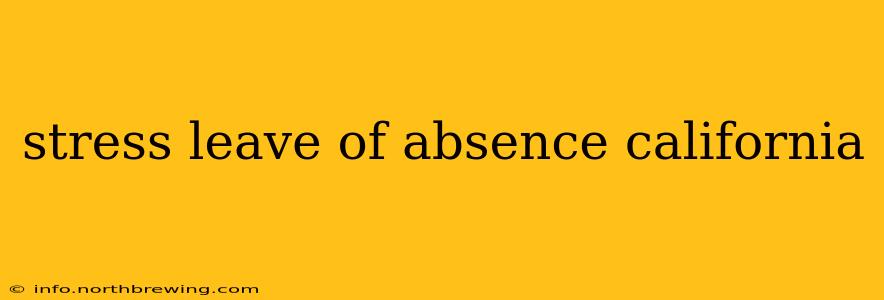Feeling overwhelmed and burnt out? In California, employees facing significant stress may be entitled to leave, though the specific type of leave and its eligibility criteria depend on several factors. This guide provides a comprehensive overview of stress leave options in California, clarifying the complexities and empowering you to navigate this challenging situation.
What is Considered a "Stress Leave"?
California doesn't have a specific "stress leave" law. However, employees may be able to take leave under several existing laws, depending on the nature and severity of their stress-related condition:
-
California Family Rights Act (CFRA): This law allows eligible employees to take unpaid, job-protected leave for their own serious health condition, including mental health conditions like severe stress leading to anxiety or depression. A "serious health condition" generally requires medical treatment, such as therapy or medication.
-
Americans with Disabilities Act (ADA): If your stress results in a disability that substantially limits one or more major life activities, you may be entitled to reasonable accommodations under the ADA. This could include modified work schedules, a leave of absence, or other adjustments to help you perform your job.
-
Workers' Compensation: If your stress is directly caused by your job (e.g., workplace harassment, extreme pressure, traumatic event), you may be eligible for workers' compensation benefits. This covers medical treatment and temporary disability payments.
How to Request a Stress Leave of Absence in California?
The process for requesting leave varies depending on the legal basis for your leave. It's generally recommended to:
-
Consult with your doctor: Obtain medical documentation outlining your condition and the need for leave. This is crucial for supporting your leave request under CFRA or ADA. The doctor may also suggest specific accommodations or treatment plans.
-
Notify your employer: Inform your employer in writing of your need for leave, specifying the type of leave you are requesting (CFRA, ADA, or workers' compensation) and the anticipated duration. Attach your medical documentation.
-
Follow your employer's policies: Your employer may have specific internal policies regarding leave requests. Familiarize yourself with these policies and follow the established procedures.
-
Consider legal advice: If you encounter difficulties with your employer or face challenges securing leave, it's advisable to seek legal advice from an employment lawyer.
What are the eligibility requirements for CFRA leave for stress?
To be eligible for CFRA leave due to stress, you must meet specific criteria:
- Work for a covered employer: Your employer must have 50 or more employees within a 75-mile radius.
- Work a minimum number of hours: You must have worked for your employer for at least 12 months and have worked at least 1,250 hours during the past 12 months.
- Have a serious health condition: Your stress must result in a serious health condition requiring medical treatment, as determined by your doctor.
How long can I take stress leave in California?
The length of your stress leave will depend on the type of leave and the severity of your condition:
- CFRA: Up to 12 weeks of unpaid, job-protected leave.
- ADA: The duration of ADA leave is determined on a case-by-case basis, based on your individual needs and the nature of your disability.
- Workers' Compensation: The duration of leave depends on your recovery progress and your doctor's recommendations.
Will I be paid during my stress leave?
Generally, CFRA leave is unpaid. However, some employers may offer paid time off (PTO) that you can use concurrently with your CFRA leave. Workers' compensation may provide temporary disability payments. ADA accommodations do not guarantee paid leave, but the employer may offer paid leave as a reasonable accommodation.
Can my employer deny my stress leave request?
Your employer cannot arbitrarily deny your leave request if you meet the eligibility requirements for CFRA, ADA, or workers' compensation. However, they may need additional information or documentation to assess your request. If your request is denied, it's recommended to consult with an employment lawyer.
This information is for general guidance only and does not constitute legal advice. If you have specific questions or concerns regarding your situation, consult with an experienced employment lawyer in California. Remember to prioritize your mental health and seek professional help if needed.
